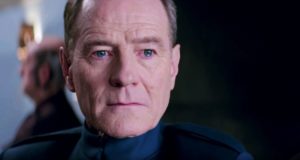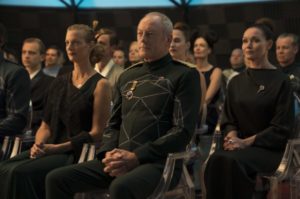
 Philip K. Dick’s Electric Dreams – Human Is
Philip K. Dick’s Electric Dreams – Human Is
Starring: Bryan Cranston, Essie Davis, Liam Cunningham, Ruth Bradley
Director: Francesca Gregorini
Writer: Jessica Mecklenburg
Reviewed by Sidney Morgan
This review CONTAINS SPOILERS.
The latest Philip K. Dick’s Electric Dreams entry, Human Is, is a three-act episode: the exposition, the mission, and the return. During the first, typical storytelling occurs. The world in which the episode takes place is shown and explained. The year is 2520 and Earth can barely sustain life, as the air has become toxic. Luckily, planet Rexor IV has an abundance of elements to clean our air. However, in typical human fashion when an important resource is needed, they take it by force. The Rexorians, who look like a plasma globe, predictably object, which results in a war. And where there is war, there tend to be war heroes.

Silas (Bryan Cranston, Breaking Bad), the most recent medal of honour recipient for bravery during its latest mission, is married to Vera (Essie Davis, The Babadook). It is a loveless marriage, one that was arranged for the purposes of procreation. Silas is a hard man, a military man, and an overbearing man. He dominates Vera, abusing her psychologically, and she fears him. Both are quite happy to spend as much time apart as possible. But Vera wants more. She needs more. She longs for tenderness, for human touch. And she acts to fulfill her needs, visiting the equivalent of a red light district, engaging in an exhibitionist threesome that plays out on-screen like a Madonna or Lady Gaga video.
During the second part of the show, the mission, Silas leads another mission to extract resources. But something goes wrong, and their ship isn’t heard of anymore. Vera is in shock and blames herself. She feels guilty, yet also at peace. This transition part of the episode is void of emotion and meaningful interactions. There is only silent brooding. There is no apparent joy, even if it means the abuse is gone. But is it?

In the third act, Vera finds out that the ship did, in fact, survive, as did her husband. When he’s returned to Vera’s care, it doesn’t take her long to discover that this is not the man she married. Silas is now attentive, caring, loving, making her breakfast and touching her as she so longed for. He’s the opposite of what he was. General Olin (Liam Cunningham Game of Thrones) and Vera suspect that he’s a metamorph (body and mind taken over by a Rexorian) and events are set in motion to find out. Though most of the episode, including the end, was predictable, there seems to be an odd message communicated.
The episode isn’t really about abusive relationships, but it nonetheless uses it as an element to contrast the before and after versions of Silas. In that respect, it works. But what about Vera? What about the woman who lived in an abusive relationship? The woman who slept with perfect strangers to fulfill that longing she so desperately sought? What about this woman that was at peace when her husband was thought gone? Well, Vera hasn’t changed. She’s the same woman. Post-mission Silas isn’t the same man anymore. Vera senses it. She knows it. This version of Silas satisfies all her needs, without the abuse! She doesn’t need to go seeking it anymore. It has come to her. Though this works out for Vera, it’s not what this episode is really about.
Human Is, which mirrors the short story, doesn’t hide the fact it addresses one of Philip K. Dick’s common themes (heck, it’s in the title!). What does it mean to be human? Unfortunately, the episode doesn’t give a definite or even satisfying answer. To prove Silas is human, Vera refers to his willingness to sacrifice himself for another and to his capacity to love and care. But is that really all there is to it? If I morph myself into a giant chicken and exhibit those traits Vera refers to, does that make me human?
Vera isn’t necessarily wrong that those attributes are part of what makes one human, but surely that isn’t it? I would hope that there is far more to it than that. Human Is provides the beginning of an answer but fails to analyze and expand. And how Vera structures her argument, there really isn’t any prodding to continue the conversation beyond the show.

The actors do a great job at fleshing out their roles. Bryan Cranston plays his two selves so well. It is part of the reason the end is predictable. Essie Davis looks stoic throughout the episode but allows a few moments for us to see the burden she carries, the emptiness of her life. She lets us sympathize with her to the extent that her choices make sense. In the context of what happened, we can’t fault her as we want her to be happy. And though in a minor role, it’s always fun to see Liam Cunningham.
Perhaps the biggest knock against this faithful adaptation is the lack of suspense. The actions, the plot, the behaviours, even the end, are quite predictable. This doesn’t take away from its overall quality. However, in comparison with the other entries in this anthology, it isn’t an edge of your seat story. Perhaps it’s a consequence of having Philip K Dick’s stories and their ideas and themes used in so many subsequent movies.
Verdict: A soft watch. It’s not one of the strongest entries in the anthology, but the story is good. The actors, the setting, the atmosphere, the mood all work together to make it a fun hour.



![[REVIEW] THE TOM CLANCY CHRONICLES – THE DIVISION 2](https://geekd-out.com/wp-content/uploads/2019/07/tctd2_metaimages_default-150x150.jpg)